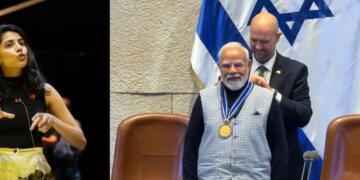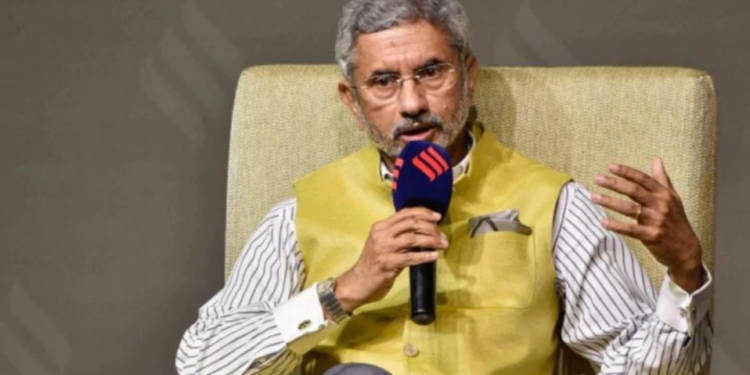S Jaishankar, the dynamic External Affairs Minister of India on Friday spoke in an interview with Le Monde in London. Jaishankar minces no words while drawing a contrast between India and other countries, and his conviction and his propensity for demolishing arguments against India makes the audience sit back and listen in awe.
Jaishankar asserted firmly that Indian nationalism cannot be perceived with a western lens saying, “You (the West) see us through your prism, you attribute to us a behaviour that you practice yourself. But we are not you!”
On a question of Indian Muslims feeling uncomfortable and friction being created between them and the Hindus, Jaishankar replied with an emphatic ‘no’ and explained the crux of Indian nationalism. He said, “In India, we are in a sense a civilization state, with natural, linguistic, ethnic and religious diversity. We have never considered uniformity as a necessity or an aspiration…..with the progress of democracy and educational standards in India, many more people are participating in the political debate. Today, politics in India is less westernized, less elitist. We are moving more towards what India really is, towards a style more rooted in Indian culture. That’s a good thing. The western world sees this as nationalism, it’s not so.”
Earlier, at the World Economic Forum, Jaishankar had stated that “India is an exception as we are more nationalistic, but at the same time, we don’t see a tension between being nationalistic and being international, in the sense of engaging more with the world, so nationalism is not a negative sentiment.”
Indian nationalists obviously keep national interest above all, but there is no empirical evidence to suggest that they bear hatred towards the international community. While being nationalists at heart, Indians are aware of how good relations with other countries can lead to India’s betterment. As such, they are not oblivious and blinded by their nationalism, as some would suggest.
Western nationalism is centred around the colonial mindset, and is based out of the colonizers’ dream of having dominion over everybody. It is exclusivist, not to mention outright racist and supremacist. Western nationalism is hollow and makes no space for diverse people and ideologies. Hard-core western nationalists exude hate speech on a daily basis. It is a popular belief among the intellectual circles that if Indian nationalists were to be made to stand with their western counterparts, Indians would easily be identified as openly ‘liberal’.
Jaishankar brilliantly puts, “Today, politics in India is less westernized, less elitist. We are moving more towards what India really is, towards a style more rooted in Indian culture. That’s a good thing. The western world sees this as nationalism, it’s not so.”
Nationalism in the West is also largely based on the basis of language, especially as is seen in Europe. Rampant divisions are created in western societies as nationalists there look to overpower the large diversities prevalent in their countries. The fact also is that many western nations have not been ‘colonized’ in the truest sense, and even if they have, independence was given to them long before India. Hence, their knowledge of history is minuscule when compared to India.
India, on the other hand, has gained independence from a brutal British rule an odd seventy years ago. As such, our memory is replete with incidents where Indians have been overpowered by the West. We have struggled to regain our pride and independence, and the struggle has been so long and so violent, that India refuses to forget the wounds cast by the colonizers on this land, added with the pain of Partition.
Indian nationalism must be looked at from the context of the colonized, the overpowered, the oppressed- who want to reclaim their country and its rich culture, and who want to shake off and cleanse their present of the remnants of colonization, Islamic invasions and the resultant subjugation.
Moreover, Indian nationalism is also built on a civilizational factor. One which bears true faith to the idea of Bharat Mata, that this land is holy and rich in diversity. In India, nationalism is practised irrespective of religion, and also influenced by the Indic religions that sprung from this soil. It is not a language-based nationalism, as India is one of the most diverse in terms of language. It isn’t a negative term, as Jaishankar has already stated. Finally, Indian nationalism does not enforce homogeneity, but rather is more than welcoming to diverse cultures. This acceptance to all cultures stems from the inherent Sanatan nature of India as a civilization.
Here, Jaishankar clears the air on what the West thinks Indian nationalism to be. To reclaim one’s lost and subjugated culture, even if it be after 70 years of independence, is now being perceived as extreme Hindu nationalism. However, it is a mere revival of the culture which has its roots in this land. We are not looking for exclusion of anybody, it is only a collective dream that what has been lost is rightfully reclaimed, peacefully, and legally.




























